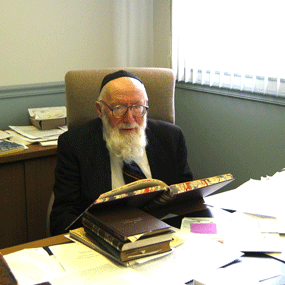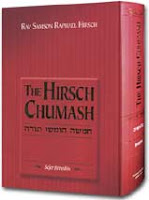Yearly Archives: 2008
Rav Freifeld z"tl on Mussar in America
The sefer Reb Shlomo tells over the following interesting observation by Rav Freifeld regarding Slabodka’s success in America:
Reb Shlomo once remarked to a talmid that the Novardok style of mussar had never really caught on in America because “to be a gornisht, a nothing, one has to first be a zich, a something, and in America no one believes in his own self-worth.” (page 139)
While the Novardok network of yeshivos was rather extensive prior to World War II, it never was rebuilt as a network. Slabodka (where Rav Freifeld’s rebbe, Rav Hutner learned) seemed to make more of an impact (just look at a small list of those who attended Slabodka you’ll notice quite a few names that influenced the major yeshivos in America). I’ve always wondered why Novardok didn’t really find a place in America. Reb Shlomo’s insight says much about the Slabodka derech of building up a person and exposing their inner Kedusha.
Note: The wesite Revach L’Neshama posted a brief biographical sketch today of the Alter of Novardok.
Sunday’s Spark of Mussar
Rav Yosef Yozel Hurwitz, the Alter of Novhardok
A person who uses his mental ability solely for worldly pursuits instead of for understanding the true Heavenly light is like a villager who finds a magniicent sculpture and uses it as a scarecrow.
From Sparks of Mussar by R Chaim Ephraim Zaitchik
Note: The Alter was a very successful businessman, as well as the founder of Novhardok network of yeshivos.
Rav Hirsch on Vayishlach-Property of a Righteous Person
According to our Sages, nistyar al pachim k’tanim ( Chullin 91a): After he
brought everything across, he returned to see whether something had
been forgotten. And to this they add: mekan l’tzadikim shechaviv alayhem
m’monom yoser m’goofom v’kol kach lamah l’fee sheain poshtin yadeihen b’gezel (ibid.).
Property that a righteous person acquires honestly — even
something of the slightest value — is sacred in his sight. He will not
squander it or allow it to go to waste, and he is held responsible for its
proper use. A vast sum is like a shoelace to him, when he gives up this
sum for the sake of a good cause; but a shoelace is like a vast sum to
him, if it is about to be wasted for no reason or purpose. A person who
is not poshat yado b’gezel, who calls his own only what he has acquired through
honest effort , will see the graces of God’s providence in every possession
that he acquires; everything that he owns — even the very smallest
possession — has come to him through honest sweat and toil and
through God’s blessing, and hence is of inestimable value.
A Punk lesson in Chizonius and Penimius
I was fully entrenched in the whole hardcore punk/alternative music scene during my younger years. I, ironically, showed my individuality by dressing mostly in black (like everyone else). That was what most of us did. How we presented ourselves was a reflection of what we listened to, it was the external reflecting the internal. There were, of course, those who expressed what I can call now “punk frumkeit”. They looked the part, had the right band t-shirts, had their hair the right way, yet were much more into the fashion that the philosophy. Back then we called them “posers”.
Some of the musicians that made up the soundtrack of my youth such as Bob Mould, Henry Rollins, and Greg Graffin held by a different philosophy. They were all in some of the fastest and loudest band out there at the time. They also dressed like your average person in their early years. I was struck, even then, that they were so “hardcore” without looking like they were. That was much more impressive than my closet of black clothing and a jacket with band names written on it. They had mastered the art of making a statement by not making a statement (interestingly the trend among some Torah observant Jews to wear ‘white shirts’ is basically the same statement).
A few years after high school I read an interview with Lee Ranaldo (from Sonic Youth) and he was quoted as saying, “Sometimes the most radical people or ideas outwardly seem very conservative”. That made sense to me. An emphasis on the internal, what’s below the surface, requires more than a casual glance. That what I aim for these days. I can’t help but be identified as a Torah observant Jew, but I try to be tzinius in my actions. Is that punk? It doesn’t matter, this is who I have chosen to be.
A Simple Jew asks me…
A Simple Jew asked me about my switch in yarmuke style. You can read about it here.
Mussar and the art of skateboard maintenance
Yeah, I know , I’m well a wear that I’m ripping off the title of the “most widely read philosophy book, ever”. But a good title is a good title.
All of the part of a skateboard are important, yet they function interdependantly. If you enjoy using your board then you’ll want to keep up with maintenance. Those things we really care about we try to keep functioning as best as possible, if you don’t it will be bad news. If you don’t, for example, tighten the trucks of your skateboard then the board itself will be really loose when you ride. If your grip-tape rips or gets wet, you need to replace it, or you will have trouble staying on your board. If your wheels get worn down, then you can’t skate. If you don’t maintain your board it’s a good sign that you are not to interested in skateboarding.
Now, you can have best skateboard in the world, but if you don’t practice then it’s only nothing more than a stage prop. Even Tony Hawk (a professional skateboarder) can’t do a trick or even skate without having a board beneath his feet. So part of maintenance is practice and part is actually having the board.
What’s the ‘how’ of maintenance when it comes to Yiddishkeit? That’s the question we all are asking. For me, maintenance is connected to motivation. I think, idealy, it comes from both external and internal sources. You have to want to skateboard, but you also need the skateboard. In regard to my Yiddishkeit, it’s almost the same.
I can have all the gear: Yarmulke, tzitzis, kosher kitchen, etc but if I’m not motivated, then these are ‘stage props’. I can have the strongest desire to attach myself to Hashem and plan to sit an learn but without engaging in Mitzvos and Limud Torah, this desire isn’t actualized.
I wish there was an easy answer, but each person is different. If you were born into a family that is Torah observant then there must have a point when you realized, “Wow, I’m so blessed to live a life of Torah and Mitzvos”. If you were not raised within a Torah observant framework there had to have been some point in your life that you thought, “This is beautiful and it makes sense. I want this life of observance”.
That could be your point of motivation and urge to engage in maintenance. As the title of this post suggests, for me that point was when I first started learning about how to work Mitzvos Bein Adam L’Makom and Bein Adam L’Chavero. The emphasis on this within Yiddishkeit is what “Wows” me (this was not the initial attraction for me however. I had been observant for about 3 years before I actually read any mussar. That’s for another posting).
Find what excites you. For some else it could be Shabbos, davening, chessed, the laws of Lashon Hara, Chassidus, Halacha, Gemora, lighting candles, the laws of family purity, Chumash, etc. Each of us has that one thing that, at one point, got us up in the morning. Somewhere along the way we just forgot what it was.
Keep all parts in tip top shape. Just like all the parts of a skateboard are important so is a balance between the many aspects of observant life: davening, mitzvos, learning, yom tov, nevel vasser, kavod habrios, tzedaka, etc.
Use it or lose it. For me, this what seems to work, is to simply go back and see what excited me. There is, I will admit, a great thrill and rush when you find a smooth stip of concrete and push off on your skateboard and let your own power and phsyics propel you. That thrill is only an echo of what true Avodah should be and can be.
Sunday’s Spark of Mussar
Rabbi Yisrael Lipkin of Salant
In the first days of his appointment as a teacher in Vilna, before his family arrived there, R’ Yisrael chose to eat at the table of others. It was customary then for the yeshiva students to eat each day with a different family, and R’ Yisrael insisted on participating in this practice, despite all persuasions that it was beneath his dignity.
From Sparks of Mussar by R Chaim Ephraim Zaitchik
Rabbi Frand shiur this Motzei Shabbos about Rav Hirsch
Question and Answer with Dixie Yid
As a parent who didn’t go through the days school/yeshiva system who has children currently in the system, have there been things that they have learned that suprised you in a postivie way?
The first thing that surprises me about them is the simple fact of the things that they know at a much younger age than I knew it. When I was starting to open a Chumash for the first time at 17 years old, it would take me a minute to break my teeth over pronouncing a two syllable Hebrew word. But my fourth grader has been saying all of bentching almost by heart for a year or two already. At 17, I only knew the really famous Bible stories and had never studied Parsha. My first grader mentioned at the Shabbos table that Rivka was from Charan, which is in Padan Aram!!! Gevalt!
This year, the kids are doing a program called “Derech,” short for “Derech Eretz Kadma LaTorah,” “Proper character traits are a pre-requisite to learning Torah.” They studied the concept of Tzelem Elokim, understanding that we must act and treat others in way that reflects consciousness of the fact that we are all created b’tzelem Elokim, in the image of G-d. This past week, they learned about making a Kiddush Hashem. The kids really get into the stories and the discussions about these things. They are a really good influence on them and it really gets their heads in the right place.
Although there are sometimes issues in the upper grades, my younger kids are just so much better off and live a much more wholesome life than outside of a nice yeshiva setting. They are truly fortunate to have such an upbringing today. We are very fortunate that we and our children’s friends don’t have televisions in the home. It is truly a bracha to be able to raise our children in such a way and be at less risk for all of the bad things that are considered normal outside the frum community.
I am surprised and amazed by how much the kids know at such a young age. They can read and understand so much Chumash, halacha, and Hebrew at such a young age. It’s beautiful to see how much a human being is capable of. Ashreinu u’matov chelkeinu, fortunate are we and how great our portion that we are able to send our children to such great schools, even when we were not able to have that kind of education!
Neil, I’d be interested to hear your answer to this question as well!




